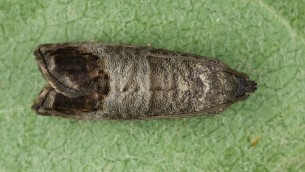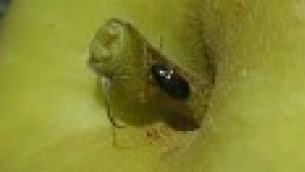Carpophilus Beetle
Carpophilus beetles (also known as dried fruit beetles) are a pest in fruits, nuts and grains. They attack a wide variety of hosts including almonds, cherries and other stonefruit. There are a number of species of carpophilus beetles. The species most prevalent in New Zealand orchards is Carpophilus davidsoni, which is particularly aggressive in cherries and other stonefruit.

Photo: Alex Wild
Photo: Alex Wild
The adult beetles can cause direct feeding damage in ripening stonefruit. Adult beetles are also a major vector of the fungal diseases including brown rot (Monilinia spp.) in a wide range of host crops. They prefer moist conditions, and beetles fly once temperatures are above 22°C. The adults lay their eggs in rotting or damaged fruit on the ground and the larvae develop within the fruit. Mature larvae then emerge and pupate in the soil. Thinning’s can also be a food source.
There are multiple overlapping generations each year, with adult beetles emerging from the orchard floor or flying in from neighbouring orchards to attack fruit in late spring and summer.
Good orchard hygiene can contribute to the control of this pest within the orchard. Removal of fallen and damaged fruit, including mulching thinnings, can reduce availability of breeding sites and helps to break the life cycle. However, in susceptible crops good hygiene practices alone often do not provide adequate control.

Photo: Dept of Agriculture and Food, WA.






